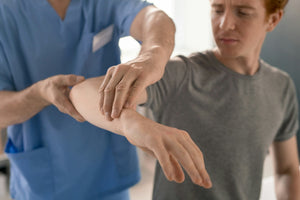Introduction to Joint Health and Pain Management
Joints are essential for movement, flexibility, and overall mobility, yet they are often overlooked until pain or discomfort sets in. Joint pain can stem from multiple causes, including injuries, arthritis, autoimmune disorders, or general wear and tear.
While some joint issues are inevitable with age, many can be managed or even prevented with proper care, a healthy lifestyle, and effective treatment strategies.
This guide explores practical tips for maintaining joint health, managing pain, and preventing damage, offering actionable advice on exercise, nutrition, alternative therapies, and medical interventions.
Understanding Joint Pain
Joint pain can range from mild discomfort to debilitating agony, and it may affect any part of the body, including knees, hips, shoulders, and fingers.
Common Causes of Joint Pain
-
Arthritis: Includes osteoarthritis (OA), rheumatoid arthritis (RA), and gout. Arthritis symptoms such as pain, stiffness, and swelling can be managed with various nutritional supplements. Glucosamine sulfate is one such supplement that may help alleviate arthritis symptoms by reducing pain and improving joint function.
-
Injury or Trauma: Sprains, strains, fractures, or dislocations.
-
Overuse or Repetitive Stress: Excessive strain from physical activity or occupation.
-
Autoimmune Disorders: Conditions like lupus and rheumatoid arthritis.
-
Infections: Viral or bacterial infections affecting joint tissues.
Types of Joint Pain
-
Acute Pain: Sudden and short-term, often due to injury.
-
Chronic Pain: Persistent pain lasting more than three months, common in arthritis.
-
Inflammatory Pain: Caused by swelling and immune system activity.
-
Mechanical Pain: Related to physical wear and tear on the joint.
Understanding the cause of joint pain is crucial for determining the right treatment approach. Consulting a healthcare professional for a proper diagnosis is always recommended.

Nutrition for Joint Health
A balanced diet rich in anti-inflammatory foods and essential nutrients can support joint health, reduce pain, and slow down degeneration.
Key Nutrients for Joint Health
-
Omega-3 Fatty Acids: Found in salmon, walnuts, and flaxseeds, these help reduce inflammation.
-
Calcium: Essential for bone density and strength; found in dairy products, leafy greens, and fortified foods.
-
Vitamin D: Helps the body absorb calcium and is obtained from sunlight, fatty fish, and supplements.
-
Antioxidants: Present in berries, oranges, and green tea; they reduce oxidative stress.
-
Collagen: A natural compound that supports cartilage health; found in bone broth and collagen supplements.
-
Glucosamine Hydrochloride: A form of glucosamine supplement that may help with joint health and offer pain relief for arthritis symptoms.
Foods to Avoid for Joint Pain
-
Processed and fried foods
-
Sugary snacks and sodas
-
Excessive red meat
-
High-sodium foods
Hydration for Joint Lubrication
Water keeps cartilage hydrated and synovial fluid at optimal levels. Aim for 8–10 glasses of water daily.

Exercise for Joint Health
Exercise is one of the most effective ways to maintain joint flexibility, strengthen surrounding muscles, and reduce pain.
Low-Impact Exercises for Joint Health
-
Walking: A simple, weight-bearing exercise that supports joint flexibility.
-
Swimming: Water buoyancy reduces joint stress, making it ideal for arthritis patients.
-
Cycling: A low-impact activity that strengthens leg muscles.
-
Yoga and Tai Chi: Improve flexibility, reduce stress, and promote relaxation.
Strength Training
Building muscle strength reduces the workload on joints.
-
Focus on quads, hamstrings, and core muscles.
-
Use resistance bands or light weights.
-
Perform exercises like leg lifts, wall squats, and gentle lunges.
Flexibility and Stretching
Stretching prevents stiffness and improves joint range of motion.
-
Perform gentle stretches daily.
-
Include exercises like hamstring stretches, shoulder rolls, and neck stretches.
Tips for Exercising Safely
-
Warm up before exercising.
-
Avoid high-impact activities if joints are already inflamed.
-
Avoid quick, repetitive movements if experiencing joint problems.
-
Listen to your body; don’t push through severe pain.
Lifestyle Adjustments for Joint Health
1. Maintain a Healthy Weight
Excess weight places strain on weight-bearing joints like knees and hips. Weight loss, even a small percentage of body weight, can significantly reduce pain.
2. Get Enough Sleep
Restful sleep supports tissue repair and reduces inflammation. Practice good sleep hygiene by maintaining a consistent bedtime and avoiding caffeine late in the day.
3. Stress Management
Stress increases inflammation, which can worsen joint pain. Techniques like meditation, mindfulness, and deep breathing exercises can help.
4. Practice Good Posture
-
Keep your spine aligned while sitting or standing.
-
Avoid slouching and use ergonomic furniture if possible.
-
Take breaks to move and stretch if sitting for long hours.
5. Avoid Overexertion
-
Alternate between activities to prevent overuse of one joint.
-
Use assistive devices like braces if needed.
Managing Rheumatoid Arthritis (RA)
Rheumatoid arthritis is an autoimmune condition where the immune system attacks joint tissues.
Treatment for RA:
DMARDs (Disease-Modifying Antirheumatic Drugs): Slow disease progression. It is important to monitor for potential side effects, as these medications can sometimes cause adverse reactions or interact with other treatments.
Biologic Medications: Target specific immune pathways.
NSAIDs: Relieve inflammation and pain.
Lifestyle Tips for RA Patients:
-
Follow an anti-inflammatory diet.
-
Engage in gentle exercises daily.
-
Avoid smoking, as it exacerbates RA symptoms.
Working with Your Healthcare Team:
Create a personalized treatment plan with your doctor to manage flare-ups and maintain mobility.
Injury Prevention and Treatment
Joint injuries can accelerate arthritis progression and cause chronic pain.
Tips for Injury Prevention:
-
Use proper lifting techniques.
-
Wear supportive shoes with good cushioning.
-
Use protective gear during sports or physical activities.
First Aid for Joint Injuries:
-
Rest: Avoid using the injured joint.
-
Ice: Apply cold packs to reduce swelling.
-
Compression: Use bandages for support.
-
Elevation: Raise the affected area to reduce swelling.
Alternative Therapies for Joint Pain
1. Acupuncture:
Stimulates nerve endings to alleviate pain and reduce inflammation.
2. Massage Therapy:
Improves circulation and reduces muscle tension.
3. Herbal Supplements:
-
Glucosamine and Chondroitin: Support cartilage health. Glucosamine is often available in supplement form, including glucosamine sulfate and glucosamine hydrochloride. These forms are not interchangeable and are commonly used to treat conditions like osteoarthritis.
-
Turmeric (Curcumin): Reduces inflammation naturally.
4. Chiropractic Care:
Focuses on spinal alignment and joint mobility.
5. Physical Therapy:
A trained therapist can design exercises tailored to your joint health needs.
Frequently Asked Questions
1. How can I make my joints healthy?
Eat an anti-inflammatory diet, exercise regularly, and maintain a healthy weight.
2. What is the best supplement for joint health?
Glucosamine, chondroitin, omega-3 fatty acids, and turmeric are popular options for pain relief and to relieve joint pain.
3. How can I naturally lubricate my joints?
Stay hydrated and eat foods rich in healthy fats like avocados and fish.
4. Why do doctors not recommend glucosamine for everyone?
Research results vary, and it may not be effective for everyone.
The Importance of Joint Health as You Age Conclusion
Maintaining joint health as you age requires a comprehensive approach that includes proper nutrition, regular exercise, lifestyle adjustments, and medical interventions. Taking proactive steps to support your joints now can help prevent stiffness, reduce pain, and improve mobility in the long run.
Joint pain is not something you have to endure silently. Early intervention and consistent joint care can significantly enhance mobility, reduce discomfort, and improve overall quality of life.
One effective way to support joint health is by incorporating QC Kinetix Joint & Bone Health QuickStart Program into your daily routine. Formulated with Vitamin D, Turmeric, Collagen, Boswellia serrata, and Boron, this supplement provides the essential nutrients your body needs to maintain strong, flexible, and pain-free joints.
Start today by implementing these simple yet effective strategies for joint health. Regular movement, proper supplementation, and ongoing medical guidance can make a lasting difference. Small, consistent steps can lead to significant improvements in joint function and overall well-being.


